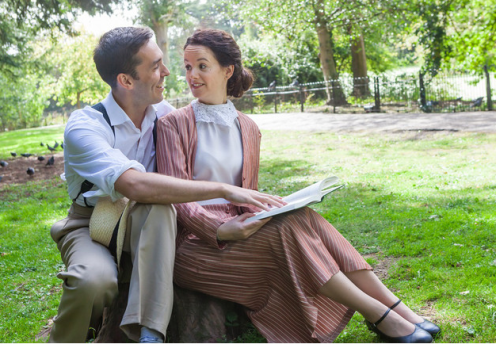Much Ado About Nothing
Love rarely tells its truths directly
Much Ado About Nothing
by William Shakespeare
Shakespeare’s Wanderers, St George’s Gardens, Bloomsbury, 22–26 July
A review by Matthew Grierson
There’s a moment in Shakespeare’s Wanderers’ Much Ado when you can see how effortless the six-strong cast have made it. Having caught our attention from the first with a natural but audible manner that successfully competes with passing pedestrians and planes, Claudio, Don Pedro and Leonata deliver their dialogue with just that bit extra, convincing us that they’re playing not only to an audience of summer-evening picnickers but the supposedly hidden Benedick as well, secreted cartoonlike against a tentpole a tenth of his diameter.
Their connivance is no more contrived than Benedick subsequently binding himself in bunting as he tries to avoid their gaze, an episode that, along with the parallel scene in which Beatrice is likewise gulled into love, show the light-hearted liveliness that the Wanderers bring to the Bard’s timeless comedy. They give clear expression to its perfect pattern, in particular the way it demonstrates that love can rarely tell its truths directly and that anything presented straight is probably a lie. When Benedick says ‘there’s a double meaning in that’, it’s one of few lines that does not itself have a double meaning.

As our leads, Mark Rush and Tara Dowd are a fine pair – an airy B&B, you might say. Rush’s long, expressive face projects his reaction as capably in silence as in speaking, and he makes the masterful switch from screwball comedy to solemnity when drawn into conflict with Claudio. Dowd meanwhile is a sparky Beatrice, and the couple sustain a convincing chemistry throughout. Their relationship, which describes an arc from pretended hate into true affection, is counterpointed by that of Julia Parlato and Philip Honeywell as Hero and Claudio, who instead move from love to hate and then to marriage. Both the latter come across as more mature than other versions I’ve seen: although Hero definitely benefits from this, it does mean Claudio can seem more dogmatic than ingenuous when suspicious of his fiancée.
The mood of the play is largely that of a balmy, nay, blazing summer evening in the urban heat island, even though the production has transposed the scene from Messina to Dover, with the consequent loss of a syllable from the verse. In fact, recurrent imagery of the seasons – Beatrice’s protests that she will not love until a ‘hot January’, or Benedick’s that her fury exceeds her beauty as much as May does December – warrant an ironic nod of recognition in our rapidly changing climate.

Whether intentionally or not, the play often acquires more resonance this way than it does from being set after the Great War. Songs of the period add a jolly touch to the dance scenes but there’s little hint of late autumnal gloom about the piece, and its relocation would feel curious were it not so buoyantly directed and ebulliently performed.
Against a khaki canvas that suggests a village summer fete as much as a military camp, the cast move with rhythmic, seamless ease between one scene and the next, and often between one part and the next along with the necessary costume change. Ben Higgins retains a sense of benign authority as Don Pedro, Sexton and the Watch despite his changes of hat, but pity Rebecca Peyton in a succession of Georgian blouses and crinolines: in the regendered roles of Leonata and Donna Julia, she has to switch frocks with unenviable speed, and if she’s suffering in the heat she doesn’t show it.

In keeping with the dualities of plot and dialogue, the production makes wry use of doubling among the cast, so ne’er-do-wells Donna Julia, Borachio and Conrad are no sooner done plotting than the actors reappear in the subsequent scene as Leonata, Hero and Beatrice, denouncing their wicked counterparts. Special mention, too, to Parlato, who as Borachio and Hero manages to be both villain and victim in the same scheme.
In other respects that scheme is not so cleverly executed; the point where Claudio is tricked into thinking his beloved is being seduced should pivot the play into tragedy, but unfortunately the moment is dispatched so quickly that it is lost, the comedy of Dogberry and Verges following hot on its heels. Similarly, Beatrice’s command that Benedick kill Claudio should merit at most a nervous titter, not the big laugh it gets tonight.
As the play moves into its tricky second half, though, these more serious undertones come to the surface, and in a world where as much authority is vested in ladies as in lords – with a syllable thereby restored to the verse – gender politics can’t help but be more apparent either.
For instance, Claudio seems more remorseful when he learns he has been tricked than he does when, taunting Benedick, he hears of Hero’s death, as though his code of honour is more important than the life of his fiancée. After this, Leonata’s insistence that he marries Hero in the guise of her cousin looks more like a punishment for bride than for groom. Indeed, the way patriarchy pervades the minds of men and women alike is strikingly evident when Hero is denounced by a Leonata rather than Leonato.
So perhaps here the postwar setting does resonate in the trauma of those who have lived through it, and want to assert an old order to prevent further conflict. To be fair, though, there is always the promise of sunnier days to come – a promise that the Wanderers keep alive even as the sky darkens over St George’s Gardens.
Matthew Grierson
July 2019

Great review – agree with most of it!
Great review – agree with most of it!